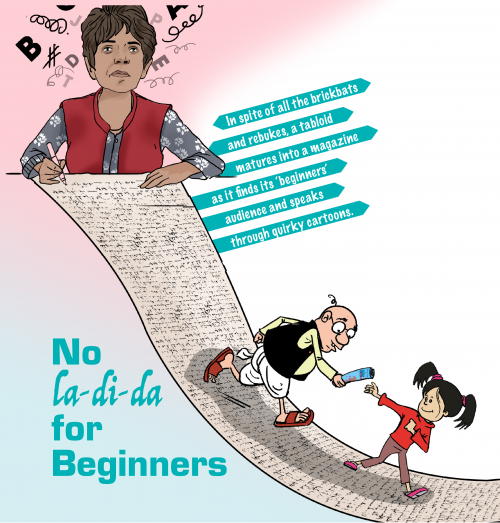 Gobar Times (GT) already had a successful 10-year run before I got on-board. It was always resplendent in a spectacular tabloid avatar, grabbing eyeballs everywhere. But as if this was not intimidating enough, here we were staging the arrival of a new GT. It’s looks? A standard news magazine format. Were we taking a risk? Well, even if we did, we were in good company. We had an emphatic affirmation from my partners of the CSE network. So far.
Gobar Times (GT) already had a successful 10-year run before I got on-board. It was always resplendent in a spectacular tabloid avatar, grabbing eyeballs everywhere. But as if this was not intimidating enough, here we were staging the arrival of a new GT. It’s looks? A standard news magazine format. Were we taking a risk? Well, even if we did, we were in good company. We had an emphatic affirmation from my partners of the CSE network. So far.
In fact, I had certain trepidations of my own. This was concerning the target group of GT. The ‘Beginners’. Who were they? GT had been envisaged as a student’s handbook. Primarily, for the schools. As it turned out, there were no defining lines. From students and teachers to bank executives, to a local milkman—everyone seemed to be set to ‘begin’.
So, it was tightrope walking for us for in every issue. First, finding topics that were equally relevant to all sections of this widely divergent group, and then presenting these to our readers… in a way that appeals to them. I would be showered with brickbats by my friends and colleagues for dumbing down a serious issue in one edition and, in the next one, a teacher would send us a mild rebuke for being so la-di-da and boring. She could not turn any of our Open Forum columns into worksheets, she scolded once.
Fortunately, we had plenty to write on. That was a decade which saw a slew of uprisings against the local authorities for letting corporate entities force into territories which belonged to them.
These were complex issues and communicating these to a lay reader was difficult. So we created cartoon characters of whose dialogue would subtly reveal the nuances of human rights violations. We used infographics and illustrations to shore up our articles. Our purpose? Creating a perfect package of authentic, scientific, and accessible information for the people of our country. To empower them to become relevant players in the debate on development and environment. For us Indians, there can be no trade-offs.
In fact, I have story of my own for the ‘Beginners’ here. I was only two months old in DTE when I was asked to prepare a comprehensive report on Global Environmental Negotiations, the ‘GEN’. Quite enamoured by the environmental extravaganza, I sat in the goldmine of information—the CSE Library—to do my research. And I was horrified. It was as if I was ambushed by words. Clumsily crafted obscure and unfamiliar. Most of the text unreadable. ‘Sustainable development’ definitely had a positive ring which would never reach the ears of the reader because it was surrounded by the ugliest ones. And as I raised my hand to bang on the table in frustration, I noticed a book which looked distinctly different. It was. This is how the definition was presented: “The environment is not just pretty trees and tigers, threatened plants and ecosystems. It is literally the entity on which we all subsist, and on which entire agricultural and industrial development depends. Development can take place at the cost of the environment. Beyond that point, it will be like the foolish person who was trying to cut the very branch on which he sat.”
I have used these words with unabashed frequency from innumerable platforms, addressing audiences that are about as diverse as it could get. And it has never failed to make an instant connect. You too go ahead and use them. Just make sure that the credit goes to the right man. It is Dr Anil Agarwal, founder of CSE. Much more about him later.